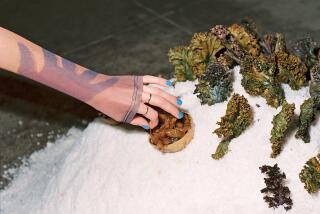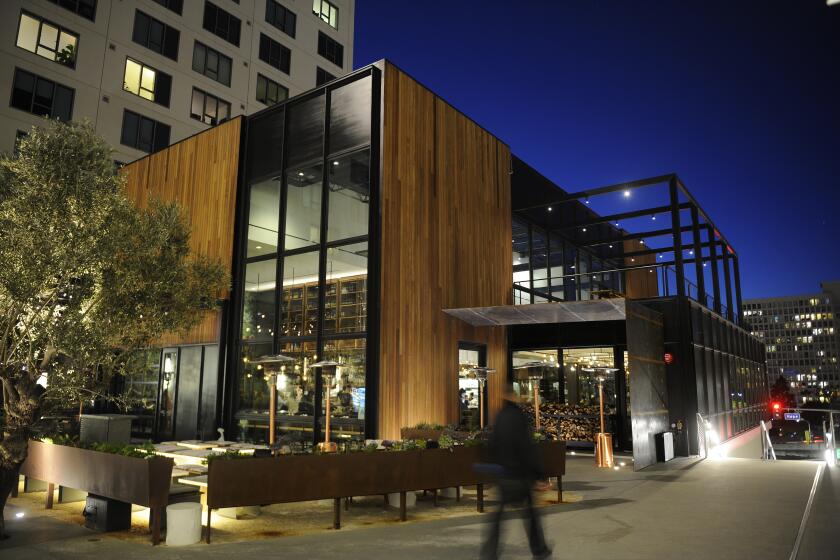Save the Akvavit
A Southern California restaurateur is taking it as a personal challenge to rescue the age-old tradition of having a small glass of Swedish akvavit on Swedish smorgasbord tables.
The tradition became an endangered species in the United States nearly a year ago, when the import of some akvavit stopped.
A clear, caraway-flavored spirit that is sipped as an aperitif, akvavit (also spelled aquavit) is made in all Scandinavian countries. Each producer uses a distinct formula of herbs, spices and barks to create a unique drink, but it is the Swedish akvavit that works well with the smorgasbord. And it was that custom that was practiced for years at Gustaf Anders restaurant in Santa Ana.
Until six months ago, that is. It was then that owner Bill Gustaf Magnuson learned that the House of Seagram would no longer import two of the most popular brands of Swedish akvavit.
“It was a little sad,” said Magnuson. “People would come in and ask for Skane (pronounced skawna ) and I’d have to say we can’t get it any more. Well, the look on their faces. . . . It was one of the last remnants of Swedish culture.
*
“Smorgasbord was what my mother used to make in the old country, and we’d all start with an akvavit. Now, Norwegian akvavit is very good, but it’s not the same.”
For years, Skane, O.P. Anderson and two other smaller brands of Swedish akvavit had been imported to the United States by Carrillon Imports, which had distribution rights to Absolut vodka. A few boxes of the akvavits were added to each shipment of Absolut.
The problem occurred last Feb. 1, when the Swedish government’s wine and spirits monopoly, Ab Vin och Sprit Centralen, granted exclusive rights to distribute Swedish spirits to the House of Seagram, which said it would no longer piggy-back the Absolut shipments with cases of akvavit.
Magnuson, mindful of the large Swedish population in Orange County, asked patrons to sign a petition to Seagram, asking the firm to continue bringing in the spirit. The petition, with more than 1,000 signatures, was sent to the desk of Seagram executive Bob Bernstein, who is handling Absolut.
“It was not a high priority to bring these ( akvavits ) in,” admitted Bernstein in an interview. “Carrillon sold 400 or 500 cases of these things throughout the United States each year, but we had a lot of things to straighten out with our recent acquisition of Absolut.” H said the headache of getting the akvavits legally labeled in various jurisdictions complicated matters.
*
Bernstein added: “The federal label requirements, the state label requirements, and registration forms you have to fill out for each state . . . it’s not easy.”
Bernstein said Seagram became aware of the flap caused by its decision in mid-1994: “We had a bunch of requests from some on-premise accounts, and we are trying to make arrangements with one of our wholesalers who has an import license to bring in two or three of the most popular brands.
“I understand their concern, and we’ve been trying for a year to make this happen, but we’re at the mercy of the Vin and Sprit folks. They understand our concern to make the akvavits available, and we’re working on it. But there’s no guarantee this is going to happen.”
Magnuson said he was frustrated dealing with behemoths like Seagram and Ab Vin och Sprit Centralen. “It’s like going to General Motors and asking for a car without a cigarette lighter,” he said.
He said his desire to serve Skane and O.P. Anderson was far less for the profit than the fact that “this is a cultural thing.”
*
Late last week, Magnuson got word that the cultural aspects of the case had reached official channels.
Saying the issue was clearly important to retaining cultural ties with Sweden, Andreas Ekman, minister for trade of the Embassy of Sweden in Washington, said he would pass along to the government agency Magnuson’s request for direct shipments of the akvavits.
More to Read
Eat your way across L.A.
Get our weekly Tasting Notes newsletter for reviews, news and more.
You may occasionally receive promotional content from the Los Angeles Times.






